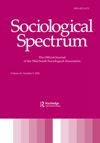移民、总统政治和美国公众的党派两极分化,1992-2018
IF 1.1
3区 社会学
Q2 SOCIOLOGY
引用次数: 11
摘要
本文通过分析趋势数据,从三个方面扩展了“移民反弹”和右翼民粹主义的理论,考察了移民观、党派两极化和总统选举投票模式之间的相互作用。首先,我们记录了移民观点如何在2000年至2018年间与党派分化更加一致。其次,我们表明,与1992年至2012年大选中的共和党总统候选人相比,移民观点对2016年唐纳德·特朗普投票的预测作用要大得多。由于党派分化加剧,移民观点对总统选举的间接影响(通过政治意识形态和政党认同作为中介)也随着时间的推移而增加,2016年的选举比以往的选举更强烈。最后,我们显示了特朗普后移民观点出现反弹的证据,政治独立人士和民主党人在2016年之后对移民的支持明显增加。到2018年,美国公众在移民问题上的两极分化程度超过了现有数据中以往任何时候,这些观点与投票模式的契合度更高。这些发现强调了移民对理解当代美国党派政治的重要性日益增加,并重申了反移民情绪和党派两极化对选举民主国家右翼民粹主义成功的重要性。本文章由计算机程序翻译,如有差异,请以英文原文为准。
Immigration, presidential politics, and partisan polarization among the American public, 1992–2018
Abstract We extend theories about “immigration backlash” and right-wing populism in three ways by analyzing trend data to examine the interplay between views of immigration, partisan polarization, and voting patterns in presidential elections. First, we document how immigration views became more aligned with partisan polarization between 2000 and 2018. Second, we show that immigration views were significantly more predictive of voting for Donald Trump in 2016 compared to Republican presidential candidates in the 1992 through 2012 elections. Due to increased partisan polarization, the indirect effects of immigration views on presidential voting (as mediated through political ideology and party identification) also increased over time, and were stronger in 2016 compared to previous elections. Finally, we show evidence of a post-Trump backlash on immigration views, with political independents and Democrats becoming significantly more favorable toward immigration after 2016. By 2018, the American public was more polarized over matters of immigration than at any time previous in the available data, and these views corresponded more strongly with voting patterns. These findings highlight the increasing importance of immigration for understanding partisan politics in the contemporary U.S., and reiterate the importance of anti-immigrant sentiment and partisan polarization to the success of right-wing populism in electoral democracies.
求助全文
通过发布文献求助,成功后即可免费获取论文全文。
去求助
来源期刊

Sociological Spectrum
SOCIOLOGY-
CiteScore
3.80
自引率
5.60%
发文量
16
期刊介绍:
Sociological Spectrum publishes papers on theoretical, methodological, quantitative and qualitative research, and applied research in areas of sociology, social psychology, anthropology, and political science.
 求助内容:
求助内容: 应助结果提醒方式:
应助结果提醒方式:


